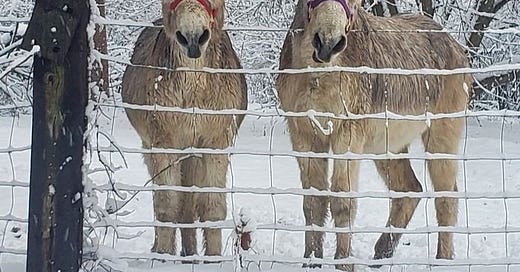Now I have a cold. And it’s just awful. After three years without a cold, I forgot how horrible my colds always are. I was going to say this was worse than ever, probably because of my not having a cold for three years, but the scientific/medical consensus is that this is not the case—it is more likely that indeed I forgot how bad it always is. See this ABC news article “Why Do Cold Symptoms Feel Worse.”
I then told myself that I was glad I was getting a cold now instead of during my book tour (15 events in January alone, involving at least 8 flights), but then I learned that there are many, many different cold viruses and immunity to one doesn’t mean immunity from another. Also, you can catch a second cold while you have your original cold—read about it here. Bummer. Maybe this is a reminder for me to wear a mask.
Also I’m surprised how cranky a cold is making me. I don’t want to talk or have anything to do with anybody. The folks at W.W. Norton asked me to choose a few good quotes from the book to highlight, and that was something I could do. I gave them a few options, so I will share them with you:
“What’s mine is yours,” Titus said. His voice had a little swing in it, like a gate that could be opened and then, just as easily, swung shut. (p. 33)
A lot of the trouble was soul trouble. People confessed terrible things to her, humiliations to which they’d been subjected, cruelties they’d themselves committed They wanted to pass their horrors onto her so she could digest them and share the burden of them, and this meant half the night she spent working through their dreams before even having her own. (p. 42)
“You are wanted in the world.” (p. 50)
Then the women came along the rows and stood the little plants upright and heaped the swamp soil onto the stems, wrapped that rich muck around each one like a woolen scarf to protect it from the cold spring nights. Sometimes a woman had to stop her work to smile and take a deep breath as she watched her husband and children, for otherwise she would spill over with an unholy kind of joy, the joy of being in a body on this earth with other beloved bodies. The women revisited each plant each week to mound the dirt a little higher and higher still, and to bind the plants to sticks to keep them growing upward instead of sprawling. (p. 94)
Mortal joy's eternal companion was suffering, and wasn't the pain of this profane earth calling out for a profane cure? (p. 95)
“Ma’am, I wish you would stay alive. You can have my arm,” she said, pressing her lips to Hermine’s cheek. “I’ll milk Delilah every day now, I’ll braid your hair—I’ll do a better job. I don’t want to run around with boys anymore.” It was a lie, but right now she wanted it to be true.” (p. 130)
It is nothing new that the greatness of great men often leads to their downfall and that their downfall also pulls the women around them down too. (p. 365)
Because men’s hearts fill naturally with longing and love for a strong leader, ordinary men often do not see their own strength. That is why a half dozen ordinary men of Whiteheart—even violent and foolish men, men who fumble in their uncertainty—can often do the right thing when a great man cannot. (366)
She lay on her belly and inched closer to the wingstem stalks to see ribbons of ice exuded from the burst-open stems in the shape of a coiled serpent or a complicated rose or a swirl of elegantly whipped cream. A frost flower! The sight took her breath away, but as she leaned in closer, her breath returned, and the flower made of ice melted, dissolved into fog. (p. 267)
“Why don’t you go back and drink with the other six dwarves,” Rose Thorn called after him, when what she wanted to say was Please don’t go. (p. 40)
“Hallelujah, amen, and let the women weep!” (p. 15 )
What most of the people of Whiteheart did not know for sure, what they did not dare ask God for fear of revealing a lack of faith, was about the value of this earthy life that they sometimes loved and sometimes hated. They wished their ancestors could come to them in sleepless hours and assure them that, beyond the long, dim scramble of making a living and taking care of every urgent thing, there was an importance in each breath taken on this earth as a human animal, a value not dependent upon a heavenly reward. (p. 194)







You are one hell of a great sentence composer, Bonnie. That's the best compliment I can give another writer.